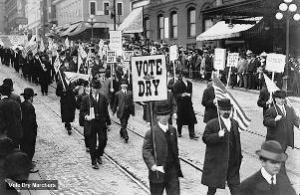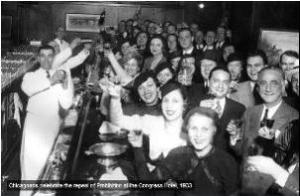Consequences of Prohibition
Drug War Issues
Politics & Advocacy
Prohibition: A Film by Ken Burns and Lynn Novick (2011, Florentine Films/WETA, 3 discs, 5 ½ hrs., $41.99)
One of America's leading documentarians has done it again. Ken Burns, producer of the widely watched and hailed documentaries, Baseball and The Civil War, has now teamed up with Lynn Novick to examine the rise, fall, and repeal of the 18th Amendment banning alcohol sales and production. It is a worthy effort, and well-executed.

Prohibition "postcards" online at pbs.org/kenburns/prohibition/send-postcards/
For most us of Prohibition is ancient history, skimmed over bloodlessly in dusty tomes in high school and undergraduate history courses. My 83-year-old mother, for instance, was still a toddler when revelers across the land tippled with delirious joy to mark repeal. For anyone younger than her -- and that's most of us -- Prohibition is no more than a school lesson, not a thing of living memory, except, perhaps, for an old story or two told by grandpa or grandma.
One of the successes of Prohibition is the way it brings that dry history to life. Through the skillful use of contemporary film, photographic stills, oral history, written remembrances narrated by actors, and a lively narration by Peter Coyote, Burns and Novick are able to recreate the living, breathing reality of second half 19th and early 20th Century America. Staring face to face at the glowering glare of a doughty battle-axe like Carrie Nation or the lizard-lidded, full-lipped gaze of Chicago gangster Al Capone, listening to Al Smith rail against the dries or Mabel Willibrand rally preachers against repeal, helps us put a human face on the passions and frailties behind the march of the social revolution that was Prohibition and the mass rejection of it that was repeal.
Similarly, vivid scenes of saloon debauchery, with passed out drunks and giddy tipplers, of speakeasies filled with good-time guys and giddy flappers, of mass marches for and against, of political conventions and campaigns in which Prohibition was a burning issue of the day, help put living flesh on the dry bones of history.
The early 20th Century experiment in social control and legislating morality contains many lessons for contemporary activists seeking to undo the damage done by drug prohibition. Burns and Novick deserve our thanks for teasing out the varied strands that turned the 19th Century's temperance movement among mostly rural, Protestant, church-going women into a political powerhouse capable of blunting the power of big booze, shuttering the breweries and distilleries, and eliminating the saloons men saw as their last refuge from the demands of wife and children.
For me, the most important achievement of Prohibition is the way in situates the temperance movement within the broader social and political context of a tension-filled, rapidly evolving America. As Burns and Novick make abundantly clear, Prohibition did not happen in a vacuum. Among the forces propelling it were many of the same forces active today propelling reactionary social movements: racism (directed against newly arrived Irish, German, and Jewish immigrants), nativism (ditto), religious bigotry (aimed at those Catholic immigrants), nationalism (against mainly German-American beer brewers, especially during World War I), and rural vs. urban tensions.
But while it may be easy to ridicule the reactionaries of the last century, the roots of Prohibition also come uncomfortably close for present-day progressives. The temperance movement -- in all its intemperance -- was closely tied to "what about the children!" sentiment and women's suffrage, a cry for healthy living, as well as the sort of "do-gooderism" conducted by "busybodies" that still informs much of the discourse when it comes to drug policy reform today.
As Prohibition shows most excellently, the politics of morality and social control are deep and twisted, and unraveling them reveals some unflattering facets of progressivism, as well as the more easily derided absolutists of what could fairly be called the Christian Right.
Where Prohibition is perhaps most useful to modern day drug reformers is in its depiction of the social ills it generated. Much as the Drug Policy Alliance likes to say "drug abuse is bad, drug prohibition is worse," viewers of Prohibition could fairly draw the conclusion that "mass drunkenness is bad, mass drunkenness under Prohibition is worse." Burns and Novick sketch the rapid expansion of organized crime under Prohibition, the gang wars of Chicago and New York, the corruption of cops and public officials -- all the side-effects of prohibition so familiar to present day reformers.

Prohibition "postcards" online at pbs.org/kenburns/prohibition/send-postcards/
In the end, Prohibition died of neglect, ridicule, and changing social attitudes, forged at least in part by the experience of Prohibition itself. And at the end, it revealed itself to be hollow, crumpling with amazing rapidity after the Great Depression hit and the big city, immigrant-friendly Democrats under FDR took power. Before the end of FDR's first year in office, Prohibition was history.
There are many lessons and parallels for contemporary drug reformers in Prohibition, but they are not exact and may not apply across the board. Alcohol prohibition lasted barely a decade, but drug prohibition is now in its second century. Why one was a flash in the pan and the other remains a painful, enduring legacy are questions that need to be answered if we are ever to leave drug prohibition in the dustbin of history along with Prohibition. Prohibition can help us start to ask the questions that will give us the right answers.
Disappointingly, Ken Burns doesn't appear interested in pursuing the parallels, nor even the dissimilarities, between Prohibition then and prohibition now. He does not reference the prohibition of other drugs in Prohibition (although heroin and cocaine were already criminalized federally and marijuana was being banned in a number of states), nor, as he has made clear in interviews, does he see a useful comparison between the two.
But that disagreement or lack of boldness notwithstanding, Prohibition is still a great viewing experience that brings alive a critical episode in US social and political history, an episode who reverberations still linger and whose contours are still echoed in drug prohibition. This is your history, America -- watch, enjoy, learn, and ponder.
This work by StoptheDrugWar.org is licensed under Creative Commons Attribution-ShareAlike 4.0 International
Comments
Legalize drugs
The film, Prhibition, parallels the drug wars. As this article points out, the evils caused by prohibition outweighed any supposed benefits. So it is with all drugs today. We are a bankrupt society, spending billions to support the prohibition of drugs. We should announce to the public that from this time our, no drugs are to be illegal, but will be available to whomever wants them, so beware. You are responsible for your health. Parents are responsible for teaching their children. So drugs will be just as available, but not illegal.
With all drugs being legal, then the price will collapse. The drug market will not be so profitable, so fewer
will produce and import them. The CIA will not be able to profit from cocaine, marijuana, and heron production, the banksters will not be able to launder the money and profit, and this huge cabal of crooked power elite will be denied their income. Make drugs legal, controlled, and taxed. This is the intelligent and effective course to take.
The time has come, with the OCW movement to have the 99% control the 1%, to legalize drugs as the way to crush the corrupt power structure. We have to do it.
Parallels of drug and alcohol prohibition
The differences in drug and alcohol prohibition provide as much insight as the similarities. During alcohol prohibition, Americans were able to see prohibition off, on, then off again. Problems created by prohibition were clear and severe. Americans responded with a constitutional amendment, no easy task, to repeal prohibition.
Drug prohibition, by contrast, was very gradual. It focused initially on Chinese immigrant use of opium in the early 1900's. After alcohol prohibition was repealed in 1933, law enforcement looking for more work added marijuana, which focused on Latinos, to the list in 1937. President Nixon further ramped up the war on drugs around 1970 and fear mongering politicians prevented Americans from even imagining an end to drug prohibition.
The U.S. was also not a superpower during alcohol prohibition, so our alcohol prohibitionist policies did not create the same problems that drug prohibition has created worldwide. Our superpower status has allowed drug prohibition to feed money to cooperative corrupt foreign parties, has enriched drug cartels, instigated and empowered terrorists worldwide.
documentary Prohibition
the parallels between alcohol prohibition and our own drug prohibition of the present day are amazing. A few zealots keep the government from surrendering in this futile endevor to regulate morality this has never been done successfully even with BILLIONS being thrown at the issue. where is the politician with the courage to say enough? How can we really justify keeping alcohol and TOBACCO legal, when the rest are ruining peoples live more from drug laws than from the substances!! talk about having the cart before the horse How much more damage must be done to the citizens so some moron who knows damn well he's lying tells the public that just a few more weapons , more erosion of our civil liberties, and most of all just a bit more3 money is all that's needed because we are on the verge of winning. REMEBER kOREA REMEMBER VIETNAM. WAKE UP PUBLIC OR YOU WILL REGRET THE DAY THEY COME TO YOUR HOUSE
In reply to documentary Prohibition by jakester (not verified)
Where is the politician with the courage to say enough?
Running for the presidency right now. That politician is not a politician but a statesman* named Ron Paul!
So get out there and support him in every way you possibly can. Become a delegate for him to the GOP conventions (local, State and national) because he who has the most delegates at the national convention wins the nomination. Donate to the October 19 "Black THIS Out" moneybomb (search that term on Youtube for more info).
* A politician thinks of the next election. A statesman, of the next generation. - by Clarke, James Freeman.
irony
its uncanny that if you substitute the word drug for alcohol nothing has changed except that the money now flows south out of the USA stop this madness and stop making criminals out of american citizens.
Great Line
Prohibition----"turning ordinary citizens into criminals and criminals into kings."
In reply to Great Line by KJ (not verified)
I'm stealing that
thank you.
Add new comment